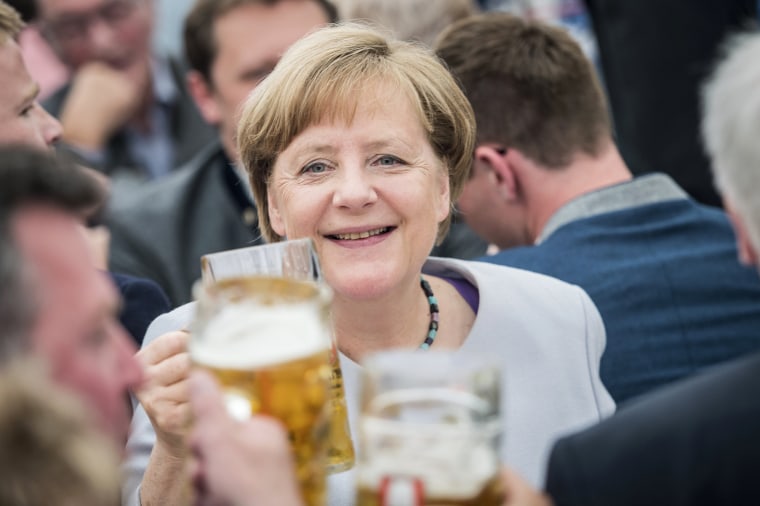BERLIN — Angela Merkel's weekend speech stating that Europe could no longer "fully count on others" was a sign of the widening cracks in the relationship between Germany and the U.S. — an alliance that has defined the post-World War II global order, experts and analysts said.
"All I can say is that we Europeans must really take our destiny into our own hands," the German leader told the crowd of some 2,500 during a campaign event at a beer tent in Bavaria. "The times in which we can fully count on others are somewhat over, as I have experienced in the past few days."
While Merkel never mentioned President Donald Trump by name, her blunt remarks followed a bruising series of meetings with the U.S. president at the NATO summit in Belgium and then at the G-7 gathering in Italy.
Trump sent a tweet criticizing Germany early Tuesday.
On Thursday, Trump did not explicitly promise to protect America's NATO allies if they came under attack, instead alleging 23 out of the 28-member nations owed "massive amounts of money" to U.S. taxpayers. The U.S.-led NATO alliance made up mainly by European countries has for decades been a bulwark against the Soviet and then Russian aggression.
At the G-7 summit, European and other diplomats were frustrated that Trump refused to endorse a global climate change accord and said he needed more time to decide. Trump was also quoted as calling Germany "very bad" on trade — but the White House denied it.
"Solidarity for Donald Trump is a commodity, only available with advance payment"
Merkel's comments were made on the election trail and therefore directed at a domestic audience as much as to an international one.
Michael van Hulten, a fellow at the London School of Economics, called Merkel’s speech “huge — German chancellor signalling the end of the post-WW2 Western consensus.”
Germany's Sueddeutsche Zeitung newspaper stated that Sunday's comments showed "Merkel no longer regards the USA as reliable."
Elmar Thevessen, the deputy editor-in-chief at German public broadcaster ZDF, said that "Merkel sent a very important signal" from Europe.
"[French President Emmanuel] Macron and other European leaders seemed to have the same takeaway" from the encounter with Trump and his delegation at NATO's headquarters and the G-7, he said.

In an op-ed, Thevessen suggested that the summits offered insight into Trump's approach to foreign affairs, which he summed up as "'America first and only.' Responsibility for the world — no chance."
"Solidarity for Donald Trump is a commodity, only available with advance payment," Thevessen added. "I am not a psychologist, but am judging as a political scientist and journalist: this U.S. president is dangerous. We Europeans can do nothing against it."
Martin Schulz, Merkel's main challenger in the September federal election, told German broadcaster ZDF that "we have to make clear to the United States that they are isolated, they are also isolated on their own continent."
On Monday, AFP also quoted Germany’s Foreign Minister Sigmar Gabriel as saying that Trump’s actions had “weakened” the West.
The U.S.-European relationship is built on the ashes of the Second World War, when America spent around $103 billion in today's dollars to help rebuild a shattered continent. The European Union has gone on to become one of Washington's key economic partners, and the world's largest trading bloc.
Ivo H. Daalder, a former U.S. envoy to NATO, told The New York Times that “this seems to be the end of an era, one in which the United States led and Europe followed."
“Today, the United States is heading into a direction on key issues that seems diametrically opposite of where Europe is heading. Merkel's comments are an acknowledgment of that new reality,” the newspaper quoted him as saying.
Michael McFaul, who was ambassador to Russia under Trump's predecessor Barack Obama, expressed dismay at the state of the key relationship.
Kori Schake, a national-security expert at the Hoover Institution think tank, was more guarded. In a tweet, she said that Obama had also damaged U.S. alliances by "calling our reliability into question," but went on to say that "Trump has damaged them more."
Andy Eckardt reported from Berlin. F. Brinley Bruton reported from London.

